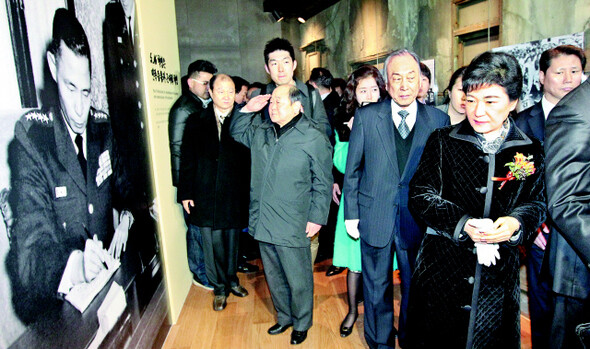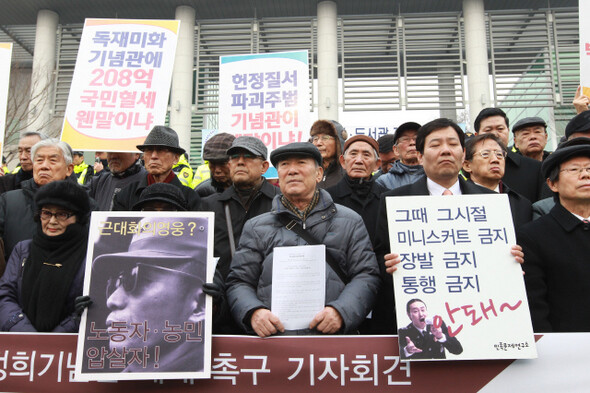hankyoreh
Links to other country sites 다른 나라 사이트 링크
Differing interpretations of a dictator’s legacy

By Park Tae-woo
The controversial Park Chung-hee Memorial-Library finally opened in Seoul’s Sangam district on Tuesday.
The three-story Memorial-Library, which cost 20 billion won ($17.75 million) in state funds, has a total area of 5260 ㎡, with an exhibition hall on the first floor, an exhibition hall and a general reading room on the second and a special materials reading room on the third. The library on the second and third floors is due to open this summer. The majority of the exhibits illustrate Park‘s economic achievements, such as agricultural development, dam and motorway construction, development of heavy and chemical industry and the Saemaeul (New Village) Movement.
“We built the memorial hall as a place of education that will allow younger generations that did not know the 1960s and 70s to see and feel how national revival and modernization were achieved,” said the President Park Chung-hee Memorial Association.
Several of the memorial’s exhibits could cause controversy. One exhibit about the May 16 coup d‘etat claims that excessive demonstrations following the April 19 revolution were causing chaos, that retrogression and failures kept occurring due to poverty, starvation and unemployment, and that the social order was reformed, with the aims of national revival and modernization, under the command of General Park Chung-hee on May 16, 1961. It displays a list of “revolutionary pledges” from the time of the military coup d’etat. It describes the Saemaeul Movement as beginning in rural villages, then spreading nationwide as a national movement of spiritual regeneration. These are realizations of the misgivings of civic groups that have until now been opposing the establishment of the memorial.
Controversy over the building of the memorial began in 1999, when former president Kim Dae-jung expressed his intention to provide financial support to the President Park Chung-hee Memorial Association in the interest of historical reconciliation. In 2001, the Seoul Metropolitan Government gave permission for the building of a memorial hall on its current site on the condition that the land and facilities built on it be donated in their entirety once construction was complete.
The association began construction, using state funds supplemented by private donations, with the aim of completing the memorial by 2004. In 2005, however, when private donations came to only 10 billion out of a target 50 billion won and the memorial construction ran into difficulties, the Roh Moo-hyun government clawed back 17 billion won in state funds. The association took legal action to have the funding returned, and won its case in 2009 due to a Supreme Court ruling. Eventually, a decision was taken at a cabinet meeting in 2010 to provide 17.4 billion won in state support. Construction was completed in November last year and the memorial opened Tuesday.


Civic groups have vociferously opposed the construction of the memorial ever since the plans were drawn up. Yesterday, too, more than 50 members of the Alliance for Historical Justice, which resists beautification of pro-Japanese activity, Korea‘s years of dictatorship and retrogressive revision of school textbooks, held a press conference in front of the memorial at which they called for it to be shut down, saying that the opening of a memorial to Park, who had a history of collaboration with Japan and dictatorial rule, was a criminal act whereby backward-looking forces had used taxpayers’ money to achieve their own political ends. In a statement, the participants asserted, “40 years after the Yusin Reforms [launched by Park Chung-hee], when they should be showing restraint, the remnants of the Yusin movement are reviving its spirit. If the Park Chung-hee Memorial-Library is allowed, we will in future come to witness the tragic farces of memorials being built to slaughterers like Chun Doo-hwan and Roh Tae-woo.”
Seoul Metropolitan Government, which is working to have the memorial returned, stated that it has not yet finalized specific plans for running the facility. “When the process of having it returned is completed following deliberation in Seoul Metropolitan Council this April, Seoul Metropolitan Government will sign a contract with the memorial association for management by consignment and finalize specific plans for running [it],” said one city official.
“When it comes to the memorial hall we may respect the opinion of the memorial association, but when it comes to the books kept in and the method of running the library, we plan to actively reflect the opinions of the city government, as there was a clause in the original contract stating that it would be run as a public library.”
Please direct questions or comments to [englishhani@hani.co.kr]
Editorial・opinion
![[Column] Is Korean democracy really regressing? [Column] Is Korean democracy really regressing?](https://flexible.img.hani.co.kr/flexible/normal/500/300/imgdb/original/2024/0705/2917201664129137.jpg) [Column] Is Korean democracy really regressing?
[Column] Is Korean democracy really regressing?![[Column] How tragedy pervades weak links in Korean labor [Column] How tragedy pervades weak links in Korean labor](https://flexible.img.hani.co.kr/flexible/normal/500/300/imgdb/original/2024/0703/8717199957128458.jpg) [Column] How tragedy pervades weak links in Korean labor
[Column] How tragedy pervades weak links in Korean labor- [Column] How opposing war became a far-right policy
- [Editorial] Korea needs to adjust diplomatic course in preparation for a Trump comeback
- [Editorial] Silence won’t save Yoon
- [Column] The miscalculations that started the Korean War mustn’t be repeated
- [Correspondent’s column] China-Europe relations tested once more by EV war
- [Correspondent’s column] Who really created the new ‘axis of evil’?
- [Editorial] Exploiting foreign domestic workers won’t solve Korea’s birth rate problem
- [Column] Kim and Putin’s new world order
Most viewed articles
- 110 days of torture: Korean mental patient’s restraints only removed after death
- 2Months after outcry over “torture devices,” Justice Ministry proposes more restraints for immigratio
- 3Beleaguered economy could stymie Japan’s efforts to buoy the yen
- 4[Column] Is Korean democracy really regressing?
- 5Koreans are getting taller, but half of Korean men are now considered obese
- 6[Column] How tragedy pervades weak links in Korean labor
- 7Former bodyguard’s dark tale of marriage to Samsung royalty
- 8Real-life heroes of “A Taxi Driver” pass away without having reunited
- 9[Editorial] Exploiting foreign domestic workers won’t solve Korea’s birth rate problem
- 10Democrats ride wave of 1M signature petition for Yoon to be impeached